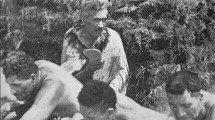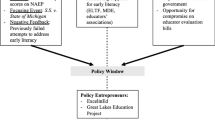Abstract
This paper is about the interaction between policy and practice, and about how competing policies contributed to a paradoxical tension within that interaction in one school. Within a paradigm of educational renewal, the Singapore Ministry of Education (MOE) has initiated a number of policies designed to give schools autonomy in designing and implementing programmes to achieve optimal educational outcomes for its students. Among these are READ! Singapore, Teach Less, Learn More and the School Excellence Model. In this context, we review an MOE initiated Extensive Reading (ER) programme in one school. Despite such innovative policies, Dewey Secondary School’s [The names of the school and individuals have been changed to protect their privacy.] pedagogical and literacy practices continue to be largely influenced by other dominant features of Singapore’s and the school’s own educational culture—an exam-oriented focus that prioritises outcome and skill-based pedagogy and the school’s historical practice of restricting literacies. Competing policies as interpreted by the school and diverse stakeholders result in a morphed ER programme—an adaptation of a reading programme that reflects the programme intent overtly but one that collides at other times, and as a result, is pulled in different directions. The story is, thus, one of ‘policies of promise and practices of limit’.
Similar content being viewed by others
References
Blair H.A., Sanford K. (2004) Morphing literacy: Boys reshaping their school-based literacy practices. Language Arts 81(6): 452–460
Bokhorst-Heng, W.D., Wolf, J. (forthcoming). A profile of an adolescent reader in Singapore: The literacy “repertoire” of the reading habit in third space. In R.E. Silver, C.C.M. Goh & L. Alsagoff (Eds.), Acquisition and development in New English contexts: Evidence from Singapore. London: Continuum.
Cheah Y.M., Ng S.M. (1998) The examination culture and its impact on literacy innovations: The case of Singapore. Language and Education 12: 192–209
Freebody P. (1992) A socio-cultural approach: Resourcing four roles as a literacy learner. In: Watson A., Badenhop A.(eds) Prevention of reading failure. Ashton Scholastic, Sydney, pp 48–60
Goh, C. T. (1997, June 2). Shaping our future: Thinking Schools, Learning Nation speech by prime minister Goh Chok Tong. In Opening of the 7th International Conference on Thinking, Monday, 2 June 1997, at The Suntec City Convention Centre. Retrieved October 15, 2006, from http://www.moe.gov.sg/speeches/1997/020697.htm.
Heath S.B. (1983) Ways with words: Language, life and work in communities and classrooms. Cambridge University Press, New York
Hull G., Schultz K. (2002) School’s out! Bridging out of school literacies with classroom practices. Teachers College Press, New York
Jacobs G.M., Davis C., Renandya W.A. (1997) Successful strategies for extensive reading. SEAMEO Regional Language Centre, Singapore
Knobel M. (1999) Everyday literacies: Students, discourse and social practices. Peter Lang Publishing, New York
Krashen S.D. (2004) The power of reading: Insights from the research (2nd ed). Libraries Unlimited, Westport, Conn
Lee, H. L. (2004). Teach less learn more. Retrieved September 4, 2006, from http://www.moe.gov.sg/bluesky/print_tllm.htm.
Lim L.H. (2003) Educational practice in leadership mentoring: The Singapore experience. Educational Research for Policy and Practice 2(3): 215–221
Livingston N. (2004) Nonfiction as literature: An untapped goldmine. Reading Teacher 57: 582–584
Ministry of Education. (1997). The extensive reading and information literacy (ERIL) programme— implementation guidelines for secondary schools. Singapore: English and School Libraries Units, Languages and Library Branch, Curriculum Planning and Development Division, Ministry of Education.
Ministry of Education. (2000). The School Excellence Model: A guide. Singapore: The School Appraisal Branch, Schools Division, Ministry of Education.
Ministry of Education. (2001). English Language Syllabus 2001 for primary and secondary schools. Curriculum Planning and Development Division, Ministry of Education. Retrieved October 10, 2006, from http://www.moe.gov.sg/cpdd/doc/English.pdf.
Ministry of Education. (2005). Towards engaged learning. A toolkit for engaged learning and teaching. Curriculum Planning and Development Division, Ministry of Education.
Ministry of Education. (2007, September 7). Information sheer. Levelling up opportunities, developing peaks of excellence in Singapore’s school landscape. Retrieved October 1, 2007, from http://www.moe.gov.sg/press/2007/files/infosheet-20070902.pdf.
Mok K. (2003) Decentralization and marketization of education in Singapore A case study of the School Excellence Model. Journal of Educational Administration 41(4): 348–366
National Library Board Singapore. (2005). READ! Singapore. Retrieved September 4, 2006, from http://www.readsingapore.nlb.gov.sg.
Ng P.T. (2003) The Singapore school and the School Excellence Model. Educational Research for Policy and Practice 2: 27–39
Ng P.T. (2004) Innovation and enterprise in Singapore schools. Educational Research for Policy and Practice 3: 183–198
Oldfather P., Dahl K. (1994) Toward a social constructivist reconceptualisation of intrinsic motivation for literacy learning. Journal of Reading Behavior 26: 139–158
Pilgreen J.L. (2000) The SSR handbook: How to organize and manage a sustained silent reading program. Heinemann Boynton/Cook Publishers, Portsmouth, NH
Sam, M. S. C., & Bokhorst-Heng, W. D. (2007). English language special focus projects in CRPP: A report (2003–2005). Singapore: Centre for Research in Pedagogy and Practice, National Institute of Education, Nanyang Technological University.
Saravanan V. (2005) ‘Thinking Schools, Learning Nation’ implementation of curriculum review in Singapore. Educational Research for Policy and Practice 4: 97–113
Shanmugaratnam, T. (2005). Speech at the MOE Work Plan Seminar 2005. Achieving quality: Bottom up initiative, top down support. Retrieved October 1, 2006, from http://www.moe.gov.sg/speeches/2005/sp20050922.htm.
Strommen L.T., Mates B.F. (2004) Learning to love reading: Interviews with older children and teens. Journal of Adolescent & Adult Literacy 48(3): 188–200
Toh K.A., Riley J.P., Lourdusamy A., Subramaniam R. (2006) School and science achievement in Japan and Singapore: A tale of two cities. Educational Research for Policy and Practice 5: 1–13
Turbill J. (1997) Understanding how frameworks ‘works’: Ten years of on-going research into teacher learning and professional development. In: Butler A., Turbill J., Cambourne B.(eds) Frameworks: Assessment and evaluation module: A staff development program for teachers. University of Wollongong Press, Wollongong
Wolf, J., Bokhorst-Heng, W. D., & Pereira, M. D. (2007). A study of one Secondary School’s Extensive Reading Programme in Singapore: Final report (No. CRP 15/04 JW Final Report). Singapore: Centre for Research in Pedagogy and Practice, National Institute of Education, Nanyang Technological University.
Worthy J., Mooreman M., Turner M. (1999) What Johnny likes to read is hard to find in school. Reading Research Quarterly 34(1): 12–27
Author information
Authors and Affiliations
Corresponding author
Rights and permissions
About this article
Cite this article
Wolf, J.M., Bokhorst-Heng, W. Polices of promise and practices of limit: Singapore’s literacy education policy landscape and its impact on one school programme. Educ Res Policy Prac 7, 151–164 (2008). https://doi.org/10.1007/s10671-008-9048-z
Received:
Accepted:
Published:
Issue Date:
DOI: https://doi.org/10.1007/s10671-008-9048-z




